

Blade Runner (Philosophical Films) PHILOSOPHICAL ISSUES: Personal identity CHARACTERS: Rick Deckard (Harrison Ford), Tyrell (owner of Tyrell Corporation), Sabastian (again genetic engineer), Rachael (Sean Young, replicant), Leon (replicant), Roy Batty (Rutger Hauer, replicant), Pris (Daryl Hannah, replicant) OTHER FILMS BY DIRECTOR RIDLEY SCOTT: Alien (1979), Thelma and Louise (1991), Gladiator (2000), Black Hawk Down (2001), Matchstick Men (2003) SYNOPSIS: Blade Runner is based on the science fiction novel by Phillip K.
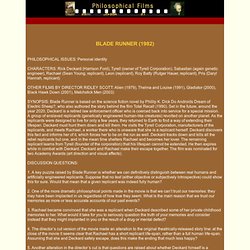
Dick Do Androids Dream of Electric Sheep? , who also authored the story behind the film Total Recall (1990). 1. 2. 3. 4. 5. 6. This film pulls no punches in asking the most troubling questions about artificial intelligence and cloning. “Blade Runner” is a very good movie and raises many interesting questions concerning human questions of personhood. Blade Runner was a great film that I really enjoyed. The futuristic backdrop of 2019 Los Angeles immediately sets the tone for Blade Runner. Ridley Scott - Is Deckard A Replicant? Was Deckard a replicant in Blade Runner. Réplicant. Blade runner Histoire d'un film (Troisième partie) Blade Runner - Deckard, réplicant ? La première version suit l'idée originale: Deckard est humain, et cela donne un énorme ou de multiples sens à ce film( bcp mieux que "2001 Odyssée", c'est pour dire…)pour peu qu'on ai les capacités intellectuelles pour se projeter (dans un environnement saturé -peu importe où et quand d'ailleurs, plein de promiscuité, un gars a quitté un job qu'il n'aimait plus, on l'oblige à reprendre; un petit chef le supervise, il sait et sent beaucoup de choses; Deckard tombe amoureux(sic), d'un robot en plus(re sic); doit tuer des machines programmées qui demandent juste à vivre plus longtemps -4ans c limite non?
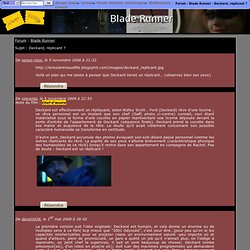
; Deckard tue ces êtres dangereusement désespérés; ce désespoir est il aussi le notre? Se demande Déckard et nous même, à travers lui, puisqu'il est humain; il découvre que son amour est immortelle et fuit avec cette réplicante-n'auront pas d'enfant! Mais il aime; la licorne finale en signe de bonne chance à vous deux de la part du petit chef -pas si malsain que ça alors… etc. etc.) 14. Is Deckard a replicant? (Blade Runner) Ridley Scott confirms that Deckard is a Replicant. More Than Human: Bladerunner's Human/Replicant Debate: PopSubCulture.com's The Biography Project. Blade Runner addresses issues arising from the differences between man and machine more than any other film. The root conflict in Blade Runner, as I see it is: What happens when machines created by man become superior to mankind?
First, what does "superior" imply? Stronger? The Nexus-6 Replicants are physically stronger than humans, this is proven numerous times throughout the film. More intelligent? Today that can physically outperform human beings in particular tasks. Replicants are treated as beings without souls, inanimate, emphasis on anima translated from Latin as "the soul". Philip K. Much like a young child who throws a tantrum rather than face the reality of an unpleasant situation, Leon murders his tormentor, rather than confront the imagery that the scenario has evoked. Rachael, on the other hand, has had human memories artificially implanted. Blade Runner riddle solved. Director Ridley Scott has finally revealed the answer to a plot twist in his film Blade Runner which has been the topic of fierce debate for nearly two decades.
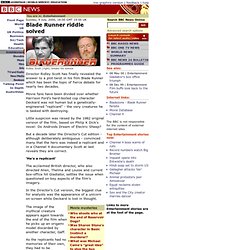
Movie fans have been divided over whether Harrison Ford's hard-boiled cop character Deckard was not human but a genetically-engineered "replicant" - the very creatures he is tasked with destroying. Little suspicion was raised by the 1982 original version of the film, based on Philip K Dick's novel: Do Androids Dream of Electric Sheep? The Parting of the Mist: An Analysis of Blade Runner. Film History: Blade Runner Joseph M.
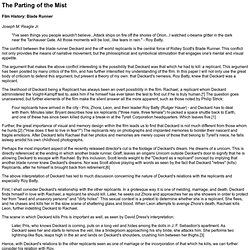
Reagle Jr. "I've seen things you people wouldn't believe...Attack ships on fire off the shores of Orion...I watched c-beams glitter in the dark near the Tanhauser Gate. All those moments will be lost...like tears in rain. " - Roy Batty. The conflict between the blade runner Deckard and the off world replicants is the central force of Ridley Scott's Blade Runner. The argument that makes the above conflict interesting is the possibility that Deckard was that which he had to kill: a replicant. The likelihood of Deckard being a Replicant has always been an overt possibility in the film. Four replicants have arrived in the city - Pris, Zhora, Leon, and their leader Roy Batty (Rutger Hauer) - and Deckard has to deal with them. Further, the great importance of visual and memory design within the film leads us to find that Deckard is not much different from those whom he hunts.[2] ("How does it feel to live in fear?
") Bibliography 1. Deckard as Replicant - Off-world: The Blade Runner Wiki. Is Deckard a Replicant?
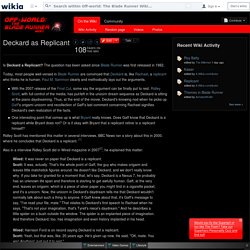
The question has been asked since Blade Runner was first released in 1982. Today, most people well-versed in Blade Runner are convinced that Deckard is, like Rachael, a replicant who thinks he is human. Paul M. Sammon clearly and methodically lays out the arguments. With the 2007 release of the Final Cut, some say the argument can be finally put to rest. Blade Runner's Original Ending: Yes, Deckard's A Replicant - Bla.